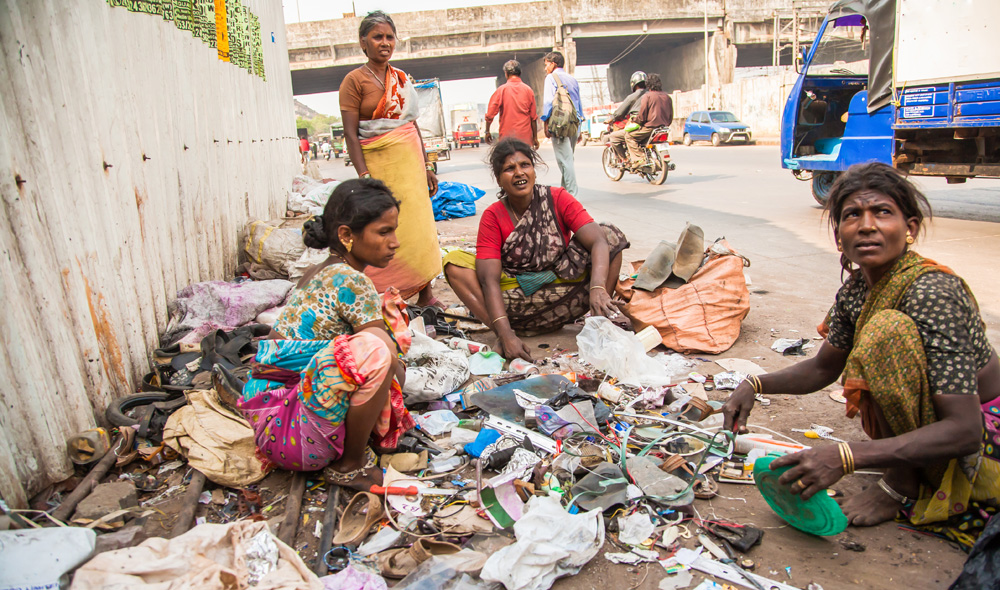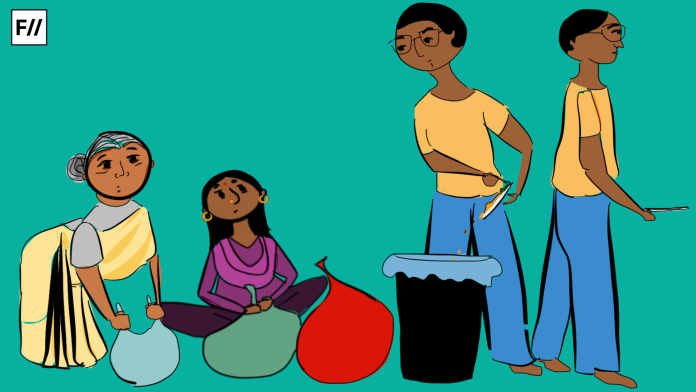Editor’s Note: FII’s #MoodOfTheMonth for July 2022 is Gender and Environment. We invite submissions on the many layers of this theme throughout the month. If you’d like to contribute, kindly refer to our submission guidelines and email your articles to sukanya@feminisminindia.com
Climate change is a topic that is receiving much attention in recent years as the earth continues to heat up and the climate clock continues to tick away. The worsening climate change can be attributed to many reasons such as poor waste management, burning of fossil fuels, deforestation, harmful fertilisers, increased livestock farming, and more.
In this article, we will look more closely at the disastrous waste management system in India and its relationship with gender roles that hold us back from improving the conditions of waste management and consequentially, the climate.
The current serving Minister of Petroleum and Natural Gas and Minister of Housing and Urban Affairs, Hardeep Singh Puri, referred to waste management as the “need of the hour” and talked about the importance of reuse and recycling. “The fundamental objective should be to maximise reuse and recycling so that minimum land space is occupied for disposal and at the same time natural resources and energy are saved,” he said.
India is slowly but surely turning into a large garbage dump. It is only to be expected that with its staggering population of approximately 1.39 people as of 2021, the country’s waste production would be in big numbers, considering the extensive and growing consumption. Statista found that by the year 2031, India will be producing about 150 million metric tons of municipal solid waste and by 2041, this figure will grow to 200 million metric tons. Without swift changes, these numbers will continue to crescendo.
Waste generation, as well as management, is affected at the household level due to the concept of gender-specific roles, gendered division of labour, and gendered consumption patterns. In terms of stereotypically gendered duties, women are expected to perform household chores such as the disposal of garbage
The major contributors to this garbage disaster are cities like Delhi, Mumbai, Chennai, Hyderabad, Bangalore, and Kolkata, which are highly populated areas that citizens from all over flock to due to the abundant employment opportunities present in these places. Resultantly, the garbage produced in these cities is of sizable quantity.
The process of waste collection and management in India is such that waste is collected through a community collective bin system, and then some of the waste is processed and even recycled, while a large proportion is simply dumped in landfills. Such open dumping practices are harmful as they can cause various types of pollution by contaminating soil and groundwater (soil pollution), making water unsafe due to surface runoffs (water pollution) and, all of these could potentially lead to health hazards for individuals.
Through using appropriate technologies, waste that is disposed off in landfills could be minimised and this would result in a reduction in the emission of greenhouse gases and other toxins.
Also read: Ghazipur Landfill: A Mountain Of Waste Almost The Height Of The Qutub Minar

Gender roles and waste management
Waste generation, as well as management, is affected at the household level due to the concept of gender-specific roles, gendered division of labour, and gendered consumption patterns. In terms of stereotypically gendered duties, women are expected to perform household chores such as the disposal of garbage.
They are mostly also responsible for the purchasing of household necessities, therefore, making them also the generators and handlers of domestic waste.
adding a lens of gendered analysis to the process of waste management could help innovate more effective ways of waste management that do not withhold opportunities based on gender. Garbage, for ages, has been recklessly dumped, and this ends up polluting the air, soil, and ground water
In many countries, both women and men gain livelihoods through waste-related occupations like sweeping and waste picking. However, women are less likely to be found in managerial roles for municipalities and private firms that work in the field of waste management. An example of how women miss out on opportunities for paid work due to their gender can be seen when looking at the instance of child waste pickers that were being endorsed by NGOs.
Multiple NGOs in Bangalore work along with street children who work as waste pickers for them to be able to earn some money. Many of these NGOs, in their attempt to help these children offer assistance strategies like night shelters and vocational training schemes. The unfortunate hurdle that exists is that girls find it difficult to take advantage of these resources.
Since night shelters are misconstrued as a place that caters to prostitution, those living in proximate areas typically are uncomfortable with that idea and would lodge complaints. While, in the case of vocational training schemes, girls that have been involved with waste picking, may be identified as “loose women”, making their chances of obtaining employment difficult.

Therefore, adding a lens of gendered analysis to the process of waste management could help innovate more effective ways of waste management that do not withhold opportunities based on gender. Garbage, for ages, has been recklessly dumped, and this ends up polluting the air, soil, and ground water.
We can all collectively make small yet vital changes to our lifestyle that would greatly enhance waste management through segregation of waste at the household level, refraining from dumping mixed waste and ceasing littering. As said by Dr. Sunil Kumar, “When considering solutions, no matter how advanced the solution is, unless and until it is applied to the ground zero level, it will not be effective.”
Also read: Waste Management: How Women Do All The Work Yet Remain Undervalued
Featured Image: Ritika Banerjee for Feminism In India
About the author(s)
Naureen is passionate about social politics, sustainable development and impact-driven economics.





